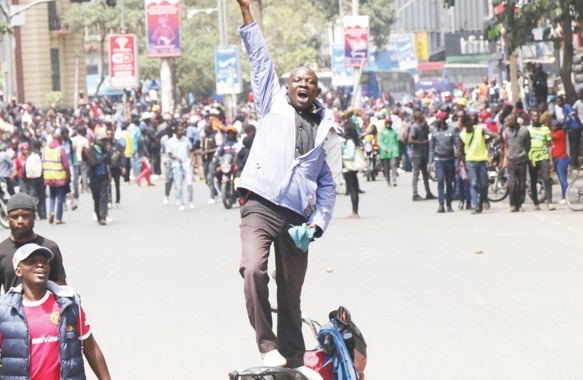2024: Year many Kenyans would rather forget

Economic hardships driven by high inflation, rising public debt, wastage of public funds, high unemployment, displays of opulence, police brutality and abductions are among the major issues that Kenyans would like to forget quickly at the dawn of 2025.
These, coupled with worsening public discontent on how the Kenya Kwanza administration has been running the country’s affairs, has been triggering demand for results from angry Kenyans who feel betrayed by their leaders.
The political spin is rooted in the contentious 2022 general election, when President William Ruto assumed office having trounced his political nemesis Raila Odinga in contested results.
Fresh start
While most Kenyans had been fed up with the previous political characters and wanted a fresh start, a leadership that aligns with and is able to address the challenges facing citizens of modest means, President Ruto has found himself at a crossroads after Kenyans who voted for him began expressing dissatisfaction with his administration over the government’s failure to address their issues.
The perceived failures and sometimes disregard for their pleas for action fuelled protests and civil unrest across the country.
Last year was a turbulent one for Kenyan workers, exemplified by the numerous instances of industrial action, said COTU secretary general Francis Atwoli.
“As the year begins, COTU (K) remains committed and determined to promote workers’ rights and welfare locally, regionally and internationally. We expect the government to devise new strategies to deal with workers’ grievances,” he added.
In what prompted public outrage, the government in May introduced the 2024 Finance Bill, a routine process that gives the government the power to collect taxes as per the needs of the country.
Ruto’s government sought to introduce new taxes, including a 16 percent tax on goods and services for hospitals, and increased import taxes from 2.5 percent to three percent, a move that was met with public disapproval.
His push for more government revenue resulted in widespread public debate and dissatisfaction, with most Kenyans blaming the government for exhibiting incompetence in handling the economy, and dealing with joblessness and graft.
Many others expressed concerns about a heightened lack of integrity, displays of opulence among politicians and lack of transparency.
To show their rage, Kenyans, led by Generation Z, protested in the streets of major towns, exposing longstanding gaps in the country’s political and social fabric and destabilising in the country.
In what began as an expression of dissent against the controversial finance Bill, the protests turned into a new page of Kenyans demanding accountability and action regarding inequality and corruption, among other issues.
In a historic turn of events, protesters managed to storm the National Assembly, burnt vehicles in front of highest court in the land – the supreme court – set the Nairobi county governor’s office on fire, among other acts of violence.
In return, dozens of protesters were killed, injured and maimed, while others were abducted without trace to date, with human right organisations, activists, leaders and the general public accusing the police of using excessive force to respond to unarmed protesters.
As a result of the unrest, President Ruto was compelled to make significant changes to his government in response to mounting pressure from both the public.
It is the Gen Zs’ protests that also pushed Ruto seek to broaden his government in a new bid to uphold inclusivity, enhance stability and stamp the legitimacy of his administration that had faced many questions.
Gen Z protests
The Gen Z protests were a turning point in Kenya’s politics and made political leaders more accountable to the electorate, according to former Laikipia Woman Rep Cate Waruguru.
“While 2024 was marred by challenges, we must also look back on this year with the knowledge that brighter days are ahead of us – that although our challenges are great, each of us has the courage and determination to rise up and meet them. Kenya has never been the same again since the Gen Z protests,” she said.
The protests were a critical moment for Kenya’s democracy, said political analyst and university lecturer Prof Macharia Munene.
“In essence, the protests made President Ruto rethink his style of governing, leading to him entering into a truce with former Prime Minister Raila Odinga and his predecessor Uhuru Kenyatta,” Macharia said.
“Since the protests, President has changed the way he operates, unlike before when he appeared to force everything.”
Pressured to change his ways, Ruto sought the assistance of Raila, his long-time political rival, whose allies were rewarded with key ministerial positions.
He would later reach out to his former boss, Kenyatta, whose associates are now on the verge of taking key ministerial positions, chairmanships of various parastatals and ambassadorial roles.
But Ruto not only faced social-economic and political challenges – his administration was also criticised following the introduction of a new funding model for university students.
The controversial model, which was ultimately suspended by the High Court, was created after recommendations from the Presidential Working Party on Education Reform and combined need-based scholarships and loans with the goal of addressing financial instability in higher education.
However, the model faced criticism for perceived discrimination, with some saying it did not get input from the public and placed an additional burden on lower-income households. Others said it had unclear implementation strategies and would widen the education gap between the rich and the poor.
In the new year, the pushback against Ruto’s administration may not end any soon, after farmers vowed to disallow vaccination of their livestock, fearing that inoculation would hurt their animals.












